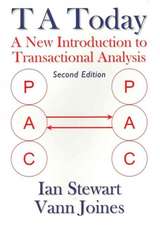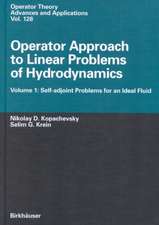The Symmetry Perspective: From Equilibrium to Chaos in Phase Space and Physical Space: Progress in Mathematics, cartea 200
Autor Martin Golubitsky, Ian Stewarten Limba Engleză Hardback – 2002
The book applies symmetry methods to increasingly complex kinds of dynamic behavior: equilibria, period-doubling, time-periodic states, homoclinic and heteroclinic orbits, and chaos. Examples are drawn from both ODEs and PDEs. In each case the type of dynamical behavior being studied is motivated through applications, drawn from a wide variety of scientific disciplines ranging from theoretical physics to evolutionary biology. An extensive bibliography is provided.
| Toate formatele și edițiile | Preț | Express |
|---|---|---|
| Paperback (1) | 592.44 lei 6-8 săpt. | |
| Birkhäuser Basel – 24 oct 2003 | 592.44 lei 6-8 săpt. | |
| Hardback (1) | 592.77 lei 6-8 săpt. | |
| Birkhäuser Basel – 2002 | 592.77 lei 6-8 săpt. |
Din seria Progress in Mathematics
- 24%
 Preț: 687.36 lei
Preț: 687.36 lei - 24%
 Preț: 740.80 lei
Preț: 740.80 lei - 9%
 Preț: 763.33 lei
Preț: 763.33 lei -
 Preț: 308.20 lei
Preț: 308.20 lei - 20%
 Preț: 695.88 lei
Preț: 695.88 lei -
 Preț: 362.51 lei
Preț: 362.51 lei -
 Preț: 308.13 lei
Preț: 308.13 lei - 18%
 Preț: 749.27 lei
Preț: 749.27 lei - 9%
 Preț: 766.42 lei
Preț: 766.42 lei - 20%
 Preț: 631.09 lei
Preț: 631.09 lei - 24%
 Preț: 638.88 lei
Preț: 638.88 lei - 15%
 Preț: 580.82 lei
Preț: 580.82 lei -
 Preț: 392.37 lei
Preț: 392.37 lei -
 Preț: 395.09 lei
Preț: 395.09 lei -
 Preț: 390.25 lei
Preț: 390.25 lei -
 Preț: 376.80 lei
Preț: 376.80 lei - 18%
 Preț: 729.53 lei
Preț: 729.53 lei - 15%
 Preț: 652.49 lei
Preț: 652.49 lei - 15%
 Preț: 649.22 lei
Preț: 649.22 lei - 18%
 Preț: 897.95 lei
Preț: 897.95 lei -
 Preț: 385.08 lei
Preț: 385.08 lei -
 Preț: 391.02 lei
Preț: 391.02 lei -
 Preț: 378.54 lei
Preț: 378.54 lei - 15%
 Preț: 531.59 lei
Preț: 531.59 lei - 15%
 Preț: 642.83 lei
Preț: 642.83 lei - 15%
 Preț: 650.69 lei
Preț: 650.69 lei -
 Preț: 381.21 lei
Preț: 381.21 lei -
 Preț: 392.37 lei
Preț: 392.37 lei -
 Preț: 398.53 lei
Preț: 398.53 lei - 15%
 Preț: 699.28 lei
Preț: 699.28 lei -
 Preț: 416.92 lei
Preț: 416.92 lei -
 Preț: 385.84 lei
Preț: 385.84 lei - 18%
 Preț: 902.65 lei
Preț: 902.65 lei - 18%
 Preț: 802.28 lei
Preț: 802.28 lei - 15%
 Preț: 640.06 lei
Preț: 640.06 lei - 18%
 Preț: 1129.83 lei
Preț: 1129.83 lei
Preț: 592.77 lei
Preț vechi: 697.37 lei
-15% Nou
Puncte Express: 889
Preț estimativ în valută:
113.44€ • 123.18$ • 95.29£
113.44€ • 123.18$ • 95.29£
Carte tipărită la comandă
Livrare economică 22 aprilie-06 mai
Preluare comenzi: 021 569.72.76
Specificații
ISBN-13: 9783764366094
ISBN-10: 3764366095
Pagini: 348
Ilustrații: XVII, 325 p.
Dimensiuni: 155 x 235 x 24 mm
Greutate: 0.66 kg
Ediția:2002
Editura: Birkhäuser Basel
Colecția Birkhäuser
Seria Progress in Mathematics
Locul publicării:Basel, Switzerland
ISBN-10: 3764366095
Pagini: 348
Ilustrații: XVII, 325 p.
Dimensiuni: 155 x 235 x 24 mm
Greutate: 0.66 kg
Ediția:2002
Editura: Birkhäuser Basel
Colecția Birkhäuser
Seria Progress in Mathematics
Locul publicării:Basel, Switzerland
Public țintă
ResearchCuprins
1. Steady-State Bifurcation.- 1.1. Two Examples.- 1.2. Symmetries of Differential Equations.- 1.3. Liapunov-Schmidt Reduction.- 1.4. The Equivariant Branching Lemma.- 1.5. Application to Speciation.- 1.6. Observational Evidence.- 1.7. Modeling Issues: Imperfect Symmetry.- 1.8. Generalization to Partial Differential Equations.- 2. Linear Stability.- 2.1. Symmetry of the Jacobian.- 2.2. Isotypic Components.- 2.3. General Comments on Stability of Equilibria.- 2.4. Hilbert Bases and Equivariant Mappings.- 2.5. Model-Independent Results for D3Steady-State Bifurcation.- 2.6. Invariant Theory for SN.- 2.7. Cubic Terms in the Speciation Model.- 2.8. Steady-State Bifurcations in Reaction-Diffusion Systems.- 3. Time Periodicity and Spatio-Temporal Symmetry.- 3.1. Animal Gaits and Space-Time Symmetries.- 3.2. Symmetries of Periodic Solutions.- 3.3. A Characterization of Possible Spatio-Temporal Symmetries.- 3.4. Rings of Cells.- 3.5. An Eight-Cell Locomotor CPG Model.- 3.6. Multifrequency Oscillations.- 3.7. A General Definition of a Coupled Cell Network.- 4. Hopf Bifurcation with Symmetry.- 4.1. Linear Analysis.- 4.2. The Equivariant Hopf Theorem.- 4.3. Poincaré-Birkhoff Normal Form.- 4.4. ?(2) Phase-Amplitude Equations.- 4.5. Traveling Waves and Standing Waves.- 4.6. Spiral Waves and Target Patterns.- 4.7. ?(2) Hopf Bifurcation in Reaction-Diffusion Equations.- 4.8. Hopf Bifurcation in Coupled Cell Networks.- 4.9. Dynamic Symmetries Associated to Bifurcation.- 5. Steady-State Bifurcations in Euclidean Equivariant Systems.- 5.1. Translation Symmetry, Rotation Symmetry, and Dispersion Curves.- 5.2. Lattices, Dual Lattices, and Fourier Series.- 5.3. Actions on Kernels and Axial Subgroups.- 5.4. Reaction-Diffusion Systems.- 5.5. Pseudoscalar Equations.- 5.6. The Primary VisualCortex.- 5.7. The Planar Bénard Experiment.- 5.8. Liquid Crystals.- 5.9. Pattern Selection: Stability of Planforms.- 6. Bifurcation From Group Orbits.- 6.1. The Couette-Taylor Experiment.- 6.2. Bifurcations From Group Orbits of Equilibria.- 6.3. Relative Periodic Orbits.- 6.4. Hopf Bifurcation from Rotating Waves to Quasiperiodic Motion.- 6.5. Modulated Waves in Circular Domains.- 6.6. Spatial Patterns.- 6.7. Meandering of Spiral Waves.- 7. Hidden Symmetry and Genericity.- 7.1. The Faraday Experiment.- 7.2. Hidden Symmetry in PDEs.- 7.3. The Faraday Experiment Revisited.- 7.4. Mode Interactions and Higher-Dimensional Domains.- 7.5. Lapwood Convection.- 7.6. Hemispherical Domains.- 8. Heteroclinic Cycles.- 8.1. The Guckenheimer-Holmes Example.- 8.2. Heteroclinic Cycles by Group Theory.- 8.3. Pipe Systems and Bursting.- 8.4. Cycling Chaos.- 9. Symmetric Chaos.- 9.1. Admissible Subgroups.- 9.2. Invariant Measures and Ergodic Theory.- 9.3. Detectives.- 9.4. Instantaneous and Average Symmetries, and Patterns on Average.- 9.5. Synchrony of Chaotic Oscillations and Bubbling Bifurcations.- 10. Periodic Solutions of Symmetric Hamiltonian Systems.- 10.1. The Equivariant Moser-Weinstein Theorem.- 10.2. Many-Body Problems.- 10.3. Spatio-Temporal Symmetries in Hamiltonian Systems.- 10.4. Poincaré-Birkhoff Normal Form.- 10.5. Linear Stability.- 10.6. Molecular Vibrations.
Recenzii
From the reviews:
"This book was awarded the Ferran Sunyier i Balaguer Prize for 2001, and I am sure that it will be a very useful resource not only for researchers in this area but also for those who want to obtain the benefits of using this approach in applications." --Bulletin of the American Mathematical Society (Review of hardcover edition)
[The] rich collection of examples makes the book … extremely useful for motivation and for spreading the ideas to a large Community. This [review] is far from complete and cannot reflect the authors’ unique way of presenting examples, asking questions, giving answers or forming an intuition.”(MATHEMATICAL REVIEWS)
"This book was awarded the Ferran Sunyier i Balaguer Prize for 2001, and I am sure that it will be a very useful resource not only for researchers in this area but also for those who want to obtain the benefits of using this approach in applications." --Bulletin of the American Mathematical Society (Review of hardcover edition)
[The] rich collection of examples makes the book … extremely useful for motivation and for spreading the ideas to a large Community. This [review] is far from complete and cannot reflect the authors’ unique way of presenting examples, asking questions, giving answers or forming an intuition.”(MATHEMATICAL REVIEWS)
Caracteristici
Winner of the Ferran Sunyer i Balaguer Prize 2000 New revised softbound edition



















